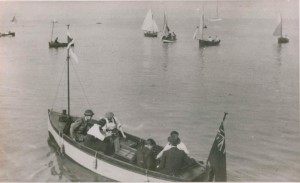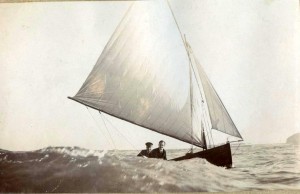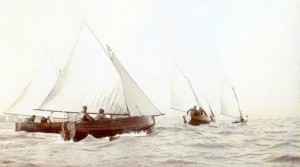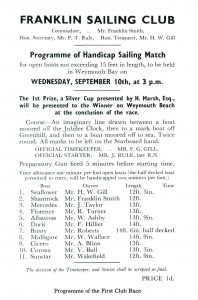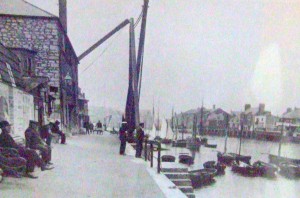Fallow Years
With the passing of the Corinthian Club. Weymouth sailing enthusiasts were left to their own devices. and seemed in no hurry to band themselves together again. The ultimate formation of a club came about after three years by a process of gradual evolution for particulars of which the writer is indebted to reminiscences and records supplied by Mr. H. W. Gill.
In these three fallow years the only organised races held in the Bay were the annual R.D.Y.C. Regattas. which though run primarily for the big visiting yachts [J and 12 metre classes] included a race for small local craft. instigated in 1904 at the suggestion of Mr. Jeflrey, a printer of Chapelhaye.
There is also on record a programme of a Town Regatta held in August 1912. which is worthy of note. The first event listed is a ‘Handicap Sailing Match for amateurs residing in the borough, three times round the Corinthian Course,’ the six entrants for which included Saracen [A. D. Hownam Meek], Argula [J. Pearse] and Dolphin [H. G. Pitcher] – all names of historic significance to this chronicle. There was also a ‘Sailing Race for boats belonging to the town … sailed by amateurs,’ for which the eight entrants included Seaflower [H. W. Gill], Mercedes [J.Taylor], Ariel [J. Vincent] and Albatross [C. Stewart].
Rivalry
Many of the ‘boats belonging to the town’ were owned by professsional boatmen. notable among whom was an old coastguard named James Rule [ex-R.N.] with two sons Robert and Percy. The latter was an enthusiastic skipper in his father’s boats, particularly in his new Albatross, in which he enjoyed challenging the local amateurs.
Leading lights among the amateurs were Mr. H. W. Gill and his brothers in Seaflower, and our present friend Mr. F. Hillier [senior] who took up the sport in 1912 with a lively little converted dinghy named Doris which Percy Rule taught him to sail to very good effect.
Franklin
In 1913 another enthusiast appeared on the scene in the form of a bluff Nova Scotian ‘Bluenose’ named Franklin E. Smith. A self-styled ‘inventor’ employed at Whiteheads Torpedo Works, this dominant character possessed just the driving force which was needed to overcome the lethargy into which the sailing community had lapsed. Entering the lists in the Rule’s Shamrock with Percy as crew Franklin became a familiar figure in the bay, and in August he [with the aid of James and Percy Rule, the brothers Gill and Major J. Pearse], instigated a series of three organized handicap races on Wednesday afternoons. These races were started by James Rule [with a 12-bore shotgun] timed by Mr. F. G. Gill, and watched by an enthusiastic crowd of supporters to whom Percy Rule sold printed programmes at a penny a time. A copy of the programme of the first of these races has been preserved by Mr. Gill, together with a photograph of the race itself in progress. This race is of vital interest to our history because it set the stage for the momentous proceedings which ensued at a tripe supper held that evening at the Star and Garter hotel.
Birth of a Club
A record of the proceedings at this repast has happily been preserved in a contemporary press-cutting which bears the impressive headline ‘Inauguration of the Franklin Sailing Club.’
‘Considerable interest was aroused on Wednesday’ runs this report ‘when it became known that a sailing match had been arranged to take place at three o’clock that afternoon. A record entry of 14 boats was obtained, and punctually at three o’clock the competitors crossed the line between the Jubilee Clock and the mark boat … A strong S.E. wind and a heavy swell proved very trying to the boats, and a fine display of seamanship was given to the crowds who lined the shore … In spite of the drenching experienced by many of the competitors, every boat completed the course.’
The winner on handicap time was Mr. Turner’s Florence, 2nd Bunty [Mr. Roberts] 3rd John Bull and 4th Seaflower [H. W. Gill]. Prizes ranging from 25s to 7s-6d were contributed by 13 patrons including Mr. Franklin Smith, Dr. Arundel, Mr. F. G. Gill and Mr. J. E . Pearse [whose boat – Little Gem– was disqualified].
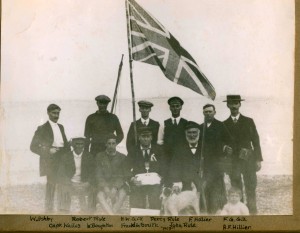
Franklin Sailing Club after inaugural first race Sept 1913. Franklin SC was renamed Weymouth SC in 1920
‘After the race’ the report continues ‘a dinner was held at the Star and Garter Assembly Rooms’ at the conclusion of which ‘the Chairman [Mr Franklin Smith] addressed the meeting, expressing the pleasure it gave him to be present that evening, and also to have been a competitor in what he described as one of the finest small boat races he had ever witnessed, speaking from experience on both sides of the Atlantic. He hoped that now such a good start had been made, these races would be continued, and suggested a series of weekly races to be held under the same rules. After presentation of the prizes it was unanimously agreed to form a Sailing Club, and on the proposition of Mr. F. G. Gill it was agreed that it be called ‘The Franklin Sailing Club’ after Sir John Franklin, the famous discoverer of the North-West Passage, and also as a compliment to their chairman. It was unanimously agreed that Mr. Franklin Smith should continue as Chairman [and Commodore], Mr. P. J. Rule as Secretary, and Mr. H. W Gill as Treasurer.
The club thus evolved has maintained its identity and tradition unchanged in all but name until the present day, and hence its inauguration at this historic meeting marks the true beginning of the Weymouth Sailing Club.
Two further races were held this year, for the first of which a cup was presented by Mr. H. Marsh and won by the Commodore who is seen holding it in the group forming the frontispiece. This group was taken immediately after the presentation on the beach, and includes all competing skippers.
One of the ambitions of the new Commodore was to fly the Blue Ensign, and hence we read in the minute book of a resolution passed at the above meeting ‘that a great effort be made to increase the membership to fifty, so as to allow an application to be made for the club to become Incorporated, thereby giving the privilege of being called The Royal Franklin Sailing Club.’
Fortunately, perhaps, for its democratic traditions, nothing came of this high-falutin’idea, though at a subsequent meeting it was resolved that the cap badges of the Commodore and Vice-Commodore should include ‘gold laurel leaves; and that the club burgee should be red with a gold maple leaf – the latter in tribute to Franklin’s Canadian origin’.
A New Committee
The new club differed from its predecessors in being essentially democratic, but soon after acquiring its official status it attracted a number of distinguished residents [including some ex-Corinthians] and these appear to have formed a tacit opposition to the existing regime. In the face of this, Mr. Percy Rule found his position as Hon. Secretary becoming so untenable that, at a general meeting in March 1914 he tendered his resignation. This resignation being accepted with regret, the meeting was declared to be the A.G.M. and the ensuing election of officers put the opposition into power by voting the secretaryship to Mr. A. D. Hownam-Meek replacing Mr. F. G. Gill [Asst Hon. Secretary] by Mr. J. E. Rink [now associated with his cup], and transferring the treasury from Mr. Ball to Mr. H. G. Pitcher. Mr. F. G. Gill, who wrote up the club minute book until he left the town in December, married Percy Rule’s sister and now lives at Swanage. Only the Commodore and Vice-Commodore were re-elected to office, Mr. Taylor and Mr. Hillier being retained on the Committee, which was augmented by Major Rudyeard and Messrs. Rolls, Hunt, J. E. Pearce, W. L. Bussell and T. R. Wakefield.
This clean sweep must have been a bitter blow for Mr. Percy Rule, who, though present, was not even elected on to a subcommittee; and indeed he was so grieved that a few days later he wrote a letter to the committee complaining of his treatment at their hands, and announcing his retirement from the club, and also that of his friend, Mr. Hillier, who stood by him. The Commodore and Mr. Taylor apparently talked them both round later, but Percy Rule never got over the slight, for his name now disappears from the records of the club which had been so much his own creation, and for which he worked so hard, The new committee drew up a set of 14 rules and fixed the annual subscription at five shillings.
The First Season
For its first season the new club was enriched by the acquisition of our now famous trophies:- The Franklin Smith Cup, The Rink Cup, the Hambro Cup and the Huxtable Rose Bowl. The first three were allocated respectively to the A, B and C classes into which boats were divided, while the Rose Bowl was reserved ‘for the boat which, in the committee’s opinion, put up the best performance for the season.’ In order to cater for the current practice of hiring beach boats it was decreed that in such cases all prizes should go to the charterers, but that for private craft all points and prizes should go to the boat and not the man. Competition for cups was regulated by five rules, one of which required holders to sign guarantees to return cups in good condition at the next autumn general meeting.
The A and B classes [over 18ft. and 14-18ft. respectively] were handicapped by taking an average of what each skipper considered to be suitable allowances for all boats in the class except his own, with automatic adjustments in units of ten seconds added according to place after each race [2nd +10, 3rd +20 etc.], an idea borrowed from the Littlehampton Sailing Club. The C class dinghies [14ft. and under] were allowed one minute per foot of overall length [below 14ft.] over a six mile course, an old Sandown Regatta rule.
In this connection Mr. Hillier recounts that his Doris was found to exceed the 14ft. limit by one inch, but her stem was so generously proportioned that the offending inch was easily removed, to the astonishment of the official measurer!
The season began with an opening cruise on May 20th, and the first race was a special sealed handicap event with an entrance fee of 1s per head [‘bob-a-nob’] to defray expenses and provide three prizes. The remaining races, scheduled for alternate Wednesdays, were to count towards the cups and monetary prizes.
The course extended from a starting line off the Jubilee Clock round a mark off the Turnpike House [the present ‘Chemmers’], and an eastern mark forming an equilateral triangle with 2 mile sides. The O.D. [usually Mr ‘Mac’ Dermott], armed with a shot-gun, a megaphone and a stop-watch, functioned from a stake-boat on the starting line, and indicated course-direction by means of a blackball hoisted on the mast above the flag for marks to port, below for marks to starboard. Boats wore racing flags, but the use of recall numbers was optional. The class flags were: A red, B white and C blue. Racing was conducted under three ‘Sailing Rules’, viz. Y.R.A. plus two local rules on course and starting.
One or more competitors seem to have caused a frown by parking unwanted ballast in the stake-boat for at a committee meeting on July 22nd a resolution is recorded that ‘judges shall not take ballast out of racing boats in future.’
World War I
Little did the framers of that resolution think that their ‘future’ would be limited to only one more race before the breaking of a world-wide storm was to end their sailing for five disruptive years. The consequences of the declaration of War against Germany [August 4th 1914] were faced at a committee meeting on August 15th when it was decided that ‘under the present war conditions there shall be no more racing this season,’ with a gleam of hope [or wishful thinking] in a final clause; ‘should conditions materially alter for the better, a further meeting shall be called.’
By the end of October, no ‘material improvement’ being evident, it was decided to award the cups to the winners for the curtailed season, ‘on the understanding that none were to be considered as won outright.’
So a little presentation ceremony was held on October 31st, when the Hambro [best performance] and Franklin Smith cups went to Mr. Hillier’s Doris, the Huxtable Rose Bowl to the club’s only lady member, the intrepid Mrs. Mackenzie Grieve, and the Rink Cup to Mr. Hownam Meek’s Saracen, to be held in safe custody by the Hon. Treasurer for Mr. Hownarn Meek, absent on active service.
In Mr. Hownam Meek’s absence the secretarial duties were taken over pro tem by Mr. T. R. [‘Pussy’] Wakefield, another honoured father of our present club, whose bearded visage and drawling voice were familiar in club circles until the beginning of the Second World War. In his work Mr. Wakefield had the staunch support of Mr. Pitcher, and, reading between the sparse lines of the minute book for the next five years, it is evident that these two stalwarts were entirely responsible for keeping the club alive during the ’14-18 War’. It is therefore fitting that we should realize and here express the debt of gratitude we owe to these our benefactors for the privileges we now so richly enjoy.
Evidence of the club’s continued activity is manifest in its effort, in the second summer of the War, to organize a programme of aquatic sports for the garrison at Portland, concerning which Mr. Wakefield wrote to the Southern Times in June 1915. ‘As it is impossible for the Franklin Sailing Club to hold their series of races this year owing to the War it has been decided to hold a series of aquatic sports for the benefit of the Troops of the Garrison. To that end the sanction of the G.O.C. and of the Commodore, Portland, has been obtained, and a strong working committee appointed. To provide prizes generous subscriptions have been given by the local Banks and tradesmen, and it is hoped that members will pay their subscriptions as usual, so that a successful series of sports can be looked forward to.’
Unfortunately nothing came of this laudable project, ‘mainly’ as Mr. Wakefield explained at a later date, ‘because most people concerned were working at high pressure.’
Mr. Pitcher’s balance sheet for the club’s first season [submitted at the A.G.M. on May 17th 1915] was copied into the minute book by the conscientious temporary Hon. Sec. and contains some interesting information. For instance, subscriptions brought in £14 10s. [45 members, plus donations] and race entry fees brought in a further £4 6s. for the five races sailed. Expenditure included items for ‘rafts, flags and signals’ valued at £2 6s. 2d. [cost price]; engraving cups 7s-4d, printing exhibition cards for cups 1s-6d., and insurance of cups [for £25] 5s. The balance at the bank was £7.
At this meeting ‘it was decided to ask Mr.J.Pearce to erase the name of the Franklin Sailing Club from the board advertising his boats on the beach.’
The next, and only other record of the War period is of the A.G.M. of 1916, on March 27th, ‘one of the stormiest nights of the past winter,’ which perhaps partly accounted for a poor attendance. The business was chiefly concerned with the recovery of cups, with particular reference to Mr. Hillier, who, in a Flanders dug-out, had other things to do!
Post-War Re-organization
The Armistice of November 11th 1918 was ratified by the Peace Treaty in May 1919, and at last the War was over. Thereupon Messrs. Wakefield and Pitcher set about the task of getting the club on its feet again and called a general meeting on June 10th. Only three other people turned up, however, so a second attempt was made on July 8th. This time nine people were present, many evidently still being occupied with the aftermath of War, including the Commodore, Vice-Commodore [now Major Lithgow, who resigned], official Hon.Secretary [Paymaster Lieut. A. D. Hownam Meek], and Mr. Rink. In view of this reduced membership. it was decided to run a programme of a few special races for small monetary prizes, and not to compete for the cups in the forthcoming season.
We read also that the question was raised of changing the name of the club, so that ‘Weymouth’ might be included in the title; but, though several were in favour of this ‘it was decided to carry on the club under its old name at present.’ Franklin was re-elected Commodore and the new Vice-Commodore was Mr R. N. Byles.
At the close of this meeting a list was recorded of members who had assisted their country during the late war and for historical purposes it is appropriate to quote it:- ‘Mr. Turner, killed in action; Mr. Kellaway lost in Leinster; Mr. Franklin Smith, work in munitions [torpedoes]; Mr. Hownam Meek, Paymaster R.N; Mr. Powell, recruiting; Major Pearce, Major Bloxham, Lieut. Rule, Messrs. Taylor, Hillier, Pitcher, Hedges, Bull, Rink and Dermott – various branches of H.M. Services; Messrs. Wakefield and George, Weymouth Volunteers.’
At a committee meeting on July 15th it was decided ‘not to take any action, as a club, in Peace Day celebrations, owing to lack of time.’
Racing Resumed
The first post-war season started with a handicap race on July 30th, open to all amateurs, with an entrance fee of 2s-6d. This was the first club race for five years and was entered by ten contestants, of which the limit boat was Bumble Bee with an allowance of 31 minutes. The race was won by Mr. Pitcher’s Dolphin in a very light breeze, which caused four boats to give up, but on the strength of the support received it was decided to run a series of three further races at fortnightly intervals, two with marks to starboard, and one with marks to port [regardless of wind direction!] The handicaps for these races were to be adjusted in units of thirty seconds ‘each boat receiving an additional half-minute from the boat finishing ahead of her’; and the Hon. Sec. [pro tem] was instructed ‘in making out the newspaper reports, to give the names of owners as well as of the boats’ – a point he had omitted in his previous report to the Weymouth Telegram.
The first race got rather badly disorganised by the weather, and had to be postponed twice – first on account of ‘wet and storm’ [August 20th] and then on account of ‘continuous rain and no wind’ [September 3rd], and when it was finally sailed on September 10th it became enveloped in a thick fog, ‘which caused the whole affair to be unsatisfactory, as it was impossible at times to find the mark buoys, and several boats went out of their courses.’ Results of this race, decided on the first round, gave another first to Mr. Pitcher’s Dolphin, with Mr. Thompson’s Cicero second, and Mr. Hillier’s new acquisition Albatross third.
This foggy race gave rise to an emergency committee meeting, ‘held on Mr. Bussell’s premises on the quay’ [the sallloft], at which it was decided that ‘owing to fog the race was no test of boat-sailing and … should not count as a club race.’ Mr. Hillier objected to this decision, but was overruled. [He had manfully come in first after two circuits]. Three further dates were fixed, and ‘it was felt that it would be more convenient if a mark buoy be placed 100 yards in a northerly direction to form an imaginary line from the pier.’ These three remaining races were more successful, the first two being won by Redwing [Mr. Byles snr.], and the third by Dolphin in a strong westerly blow, with Jose [Mr. Miles] second, and Col. Williams’ Colleen third.
The Annual General Meeting of October 1919 was again poorly attended, only eleven members being present. On the question of the return of trophies, Mr. Hillier said he would be happy to return the Hambro Cup, and eventually agreed to return the Commodore’s Cup also. Regarding the Huxtable Cup, Mr. Wakefield was instructed to write again to Mrs. Mackenzie Grieve requesting its return, and in this the lady also duly complied, attributing the delay to a recent severe illness.
The question of ownership of cups was finally clarified at a committee meeting on March 18th, 1920, when a resolution was passed ‘that all cups, the property of the club, should never be won outright, but raced for annually as challenge cups; the cups to be held until the general meeting the following October’, a ruling observed to this day.
A new set of rules was drawn up by a special sub-committee [Mr. H. N. Byles, Mr. Pitcher, Mr. Bussell and Col. Williams] during the winter; and arrangements were made for the hire of a room at the Crown Hotel as the club’s headquarters. A number of new members were elected and the club stood firmly on its feet once more, to greet a rosier future.
